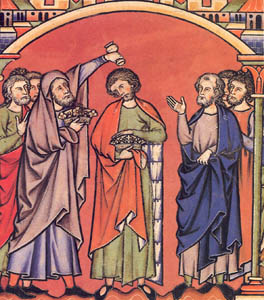Image Details

Courtesy of the Pierpont Morgan Library (MS. 638M Folio 38 Verso)
With a vessel of oil Samuel anoints David king (1 Samuel 16:13). By including two crowns the medieval artist may be suggesting David’s two other investitures: At Hebron “the men of Judah” anointed David king over Judah (2 Samuel 2:4), and later “the elders of Israel” anointed him king over Israel (2 Samuel 5:3). The kings of ancient Israel were viewed in the Bible as having a special son-like relationship to God. Later Israelites may have believed that at the moment of his anointment David had become “begotten” of God, adopted by God in a sense. As part of his investiture, a king in the line of David recited the words preserved in Psalm 2:1, “I will proclaim the decree of Yahweh: He said to me, ‘You are my son; today I have begotten you.’ ”
The word “messiah,” [
This painting appears in a medieval Bible picture book that was probably executed by Parisian artists, possibly for the French King Louis IX.
